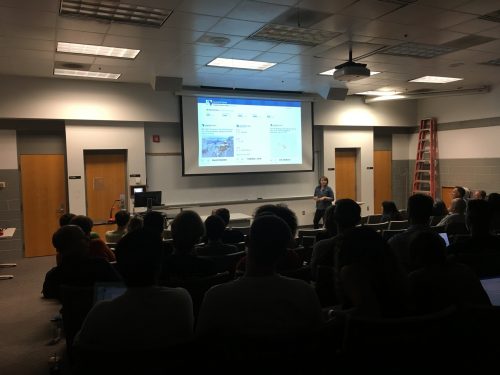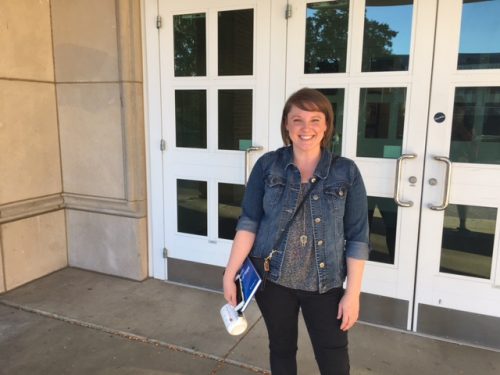

She knows if she can captivate readers past the headline on a clear, dry day, she’s doing something right. If there’s a storm system rolling in—an occurrence that happened all too frequently this fall with the near record-breaking hurricane season— then readers making it to the third paragraph is considered a success.
In short—because that’s all the character space she has—Angela Fritz, editor and forecast meteorologist for Capital Weather Gang , knows “the kinds of things people want to be hearing about” with regards to science communication.
On Sept. 28, Fritz decided to impart some of that knowledge to the faculty and students of the Atmospheric Oceanic Science department in ATL 3400. She demonstrated through website statistics how different stories either got readers to scroll down to the bottom of the page –or how the cluttered sense of jargon lost them right from the top. “As they say in Silicon Valley,” Fritz quipped, “Fail fast—and then learn from those mistakes.”
“Don’t be afraid of the feedback,” Fritz advised. For this reason, Fritz will often use the comments section as a gauge to how well her readers perceived a weather phenomena story. “Some of our best stories have originated from the fact that three people will ask the same question in the comments section,” Fritz said.
“I learn new things from our commentary every day,” said Fritz, “Everyday.”
A recent challenge was the communication of this season’s trajectory of hurricane storms with the most recent ones including Harvey, Irma, Jose, and Maria and Nate. “It’s really difficult to explain to people a hurricane is a new storm every time,” said Fritz. Explaining how Irma and Harvey were two different beasts was “a communication challenge to be sure.”
“I wrote a forecast about Irma and someone said ‘Lies!’ underneath it in the comments section,” said Fritz.
Dr. Tim Canty asked Fritz if it is a group decision whether to respond to a comment.
“It was an editorial post decision that we are going to do comments,” said Fritz, “We want it to be an active and civil and engaging community. And you can be funny and engaging without being disrespectful.”
Kevin Dougherty, a senior and writer for UMD Weather asked Fritz how in this day and age to capture readers’ attentions when headlines, such as the Kardashians, proliferate the media. “You’re competing with juicy tabloid headlines…how long does it take you to come up with a headline that competes with that?” he asked.
“I will say that I don’t know if necessarily my audience overlaps with Kim’s audience—maybe during a hurricane,” said Fritz. “But sometimes I think of a headline right off the bat. I think of a story idea and that’s my headline. Sometimes I think this is a really interesting story but I cannot for the life of me think up any headline in 80 characters by the way, that’s our limit.”
In these situations, Fritz suggests holding headline workshops or on a more informal scale just sharing headlines with a peer.
“Pass your titles around, pass your talks around,” Fritz advised.
Fritz also suggests talking to non-science majors or professions about science phenomena at least once a day to improve communication skills. She also advised giving a talk at conferences even if “it’s so nerve-wracking.”
These are all stepping stones towards improved communication regarding forecasts and research.
“We need to be covering science in an interesting way,” said Fritz.
